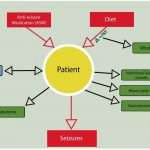The goal of the Precision Ketogenic Therapy (PKT) Program is to personalize the Ketogenic Diet by focusing on each patient’s desired outcomes and nutritional requirements. PKT requires careful monitoring by a healthcare team and relies on the commitment of the patient and their caregivers. PKT is currently offered for patients throughout the lifespan, ranging from infancy to adulthood. Careful monitoring of each patient is used to optimize efficacy, to improve compliance among patients and caregivers, and to allow long-term use.
Individuals with epilepsy have several therapy options: medications, surgery, Vagal Nerve Stimulator and change in dietary intake. Change in dietary intake can be used as the first therapy however it is commonly used to treat refractory epilepsy, which is epilepsy that cannot be controlled by medications.
Proteins, fats, and carbohydrates are the three macronutrients found in the foods that we eat. The energy that fuels our body should come from fats and carbohydrates. Vitamins and minerals are required for good overall health. Protein is composed of amino acids, but our dietary need for amino acids is not the same for all amino acids. Because our body cannot make the essential amino acids, they must be included in our diet. The same is true for the macronutrient fat that is composed of fatty acids. Because our body cannot make essential fatty acids, they must be included in our diet. Our body can create all the different types of carbohydrates that our body needs.
A typical Western diet is high in carbohydrates. Our body transforms the carbohydrates into glucose and uses the glucose for energy. The typical Western diet results in fasting blood glucose levels of 80-100mg/dL and low to negative urinary ketone levels.
However, the diet for the Precision Ketogenic Therapy Program consists of high fat, adequate protein, and low carbohydrates. When the body receives no food or receives a diet with a low carbohydrate and high fat content, the body goes into a process called ketosis. The process of ketosis breaks down fatty acids and certain amino acids into ketones and uses the ketones for energy. This results in lower fasting blood glucose levels (40-80mg/dL) and higher urinary ketone levels (5-160mg/dL).





